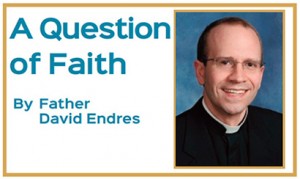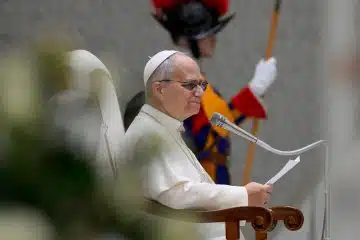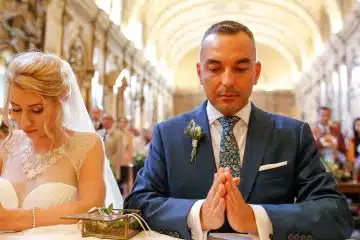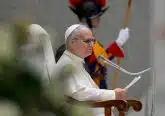Father Endres Column for February: God makes it easy to return to the Church
 Q: My husband has not practiced the Catholic faith for 30 years. What does he need to do to return to the sacraments?
Q: My husband has not practiced the Catholic faith for 30 years. What does he need to do to return to the sacraments?
A: Once baptized, a person is always a Christian. But as you note, it is possible to leave the practice of the faith
for a time (or even for the rest of one’s life). We know this is not uncommon. Catholics compose the largest denomination in the United States (about 70 million), though formerly practicing Catholics (if considered a denomination) would be the second-largest religious group in America (perhaps 23 million).
Most who leave the practice of the faith do so by the age of 23, but those who return do so at various points in adulthood. Some delay returning indefinitely, thinking they will have the chance near the end of life, but this is not certain since none of us knows when our earthly life will end and if we will have the chance to be reconciled to God and the church.
Thankfully, the road to returning to the sacraments is usually not difficult. If a person has already received all of the rites of initiation (baptism, Eucharist, and confirmation), returning to the sacraments simply entails making a good confession and desiring to practice the faith in the future. This would include a decision to attend Mass each Sunday and holy day, to confess one’s sins once per year, to follow the days of fasting and abstinence established by the church, and to provide for the support of the church.
For someone returning to the practice of the faithful, it will be helpful when approaching a priest for confession for the person to explain his or her situation to the priest. One should simply say that he or she has been away from the practice of the faith (noting the length of time) and state his or her desire to return. Ordinarily, once one has confessed and received absolution, the priest will invite them to return to weekly Mass and reception of the Eucharist. In some cases, reception of communion might need to be delayed. If, for instance, the person wishing to return to the faith is an irregular marriage (usually remarriage after a divorce), the priest will inform the penitent of the process to return to the sacraments.
If someone has been baptized, but has not received the other sacraments of initiation, he or she should contact his parish to enroll in the formation necessary to receive Eucharist and/or confirmation. Depending on circumstances, this preparation could take place outside of the process by which catechumens (the non-baptized) and candidates (usually baptized, non-Catholic Christians) are brought into the Catholic church.
The church welcomes back with open arms those who do not currently practice the faith. Returning to the sacraments is not usually a difficult or a lengthy process. Ordinarily all that is required is a desire to be united to the church’s prayer and worship and a resolve to remain faithful to Christ as a member of the church.
We are strengthened as a communion of faith when members of the Body of Christ return to the sacraments. As St. Paul reminds us, we are many parts, but one body, and if one member suffers, all suffer. And just as all suffer for one, all rejoice for one that has been returned to health and wholeness (cf. 1 Corinthians 12: 12-26).
Father Endres is dean of Mount St. May’s Seminary of the West and the Athenaeum of Ohio. Send your question of faith to [email protected].













